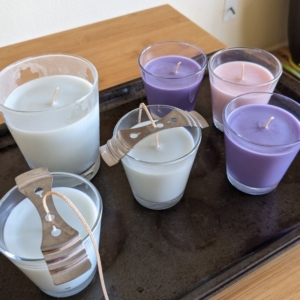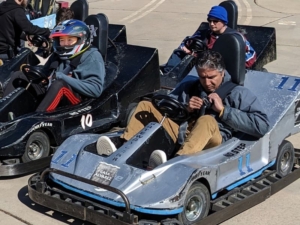Good Things Happen When Clients Take the Initiative
 Colorado Recovery approaches mental healthcare based on a path to self-reliance through developing practical skills. Our approach to care is about nurturing an environment of inclusivity, socialization, and community building. Clients are encouraged to take part in activities out in the community to achieve a certain degree of social independence.
Colorado Recovery approaches mental healthcare based on a path to self-reliance through developing practical skills. Our approach to care is about nurturing an environment of inclusivity, socialization, and community building. Clients are encouraged to take part in activities out in the community to achieve a certain degree of social independence.
Recreational activities include snowshoeing through Colorado’s spectacular winter landscape, movie nights, talent shows, trips to the Boulder Museum of Contemporary Art, and even go-kart excursions.
Peter Kamback is Colorado Recovery’s vocational rehabilitation specialist and Community organizer. We base a lot of our community activities off of the “Club House” model. He organizes, participates, and supervises many of these therapeutic activities. He is particularly proud of clients who take the initiative themselves.
Colorado Recovery client James (not his real name) recently suggested making candles with the group. “He did a great job coming up with this idea on his own,” praised Kamback. “It shows initiative to interact with others in a structured and productive way. He did prepare all the materials himself before he came over to lead the group.”
Introducing new interests and subjects is a great way for clients to make connections with one another and boost self-confidence. “It was great to see and hear his excitement when he described the process of candle-making to his fellow clients,” Kamback says. “This is something he enjoyed doing on his own and it was wonderful that he wanted to share it with others. As a result of his enthusiasm for this subject, others were stimulated to consider and share things they were interested in as well.”
This was a different experience from being part of a group led by someone else, requiring more focus and attention. “He did need some guidance when it came to coordinating all of our efforts. But this was also a learning experience for him,” says Kamback. “In his mind, James had it all figured out for himself, but he hadn’t quite worked out all the details of dividing tasks and keeping everyone engaged. So, it was a great opportunity for him to work on his leadership qualities. He paid attention to the other clients if they had questions along the way. He knew when he was needed and when he could let others proceed on their own. He also took the lead when it was unclear what to do next in the process.”
James is a pleasant, conversational person which helped a lot with this activity. However, he did not fully anticipate the limitations of the materials and tools he had at the time. “This is something that often happens when introducing a new idea or exercise to clients,” explains Kamback. “At one point there was nothing left for anyone to do but wait for the wax to cool. I’m not sure James considered this part of the process or knew how to end the activity but everyone went along with it fine.”
The candle-making experience yielded some good things for James to think about should he decide to lead another group activity in the future. He certainly acquired some new tools to better equip himself and others for ventures to come. “Overall, he did a great job,” says Kamback.
Creative socializing activities like candle-making as part of a group are all part of the groundbreaking approach to mental health treatment pioneered by the late Colorado Recovery founder Richard Warner. Recovery from serious mental illness requires that patients retain a sense of empowerment—a belief in their ability to take charge of their lives and manage the complex challenges of their illness.
At Colorado Recovery it is our mission to help adults with serious mental health issues stabilize their illness, minimize symptoms, improve functioning, and enhance each person’s social inclusion, quality of life, and sense of meaning in life.
If you have questions about our recovery model or our services to treat schizophrenia, bipolar disorder, and similar mental illnesses, call us at 720-218-4068 to discuss treatment options for you or the person you would like to help.

 Recovery is a term frequently used by people with mental health issues to describe their efforts to live meaningful and satisfying lives. Colorado Recovery approaches mental healthcare based on a path of self-reliance through developed practiced skills. This non-institutionalized social recovery offers comprehensive levels of care supported by an expert medical and clinical team, engaging patients in increasing community participation.
Recovery is a term frequently used by people with mental health issues to describe their efforts to live meaningful and satisfying lives. Colorado Recovery approaches mental healthcare based on a path of self-reliance through developed practiced skills. This non-institutionalized social recovery offers comprehensive levels of care supported by an expert medical and clinical team, engaging patients in increasing community participation.


